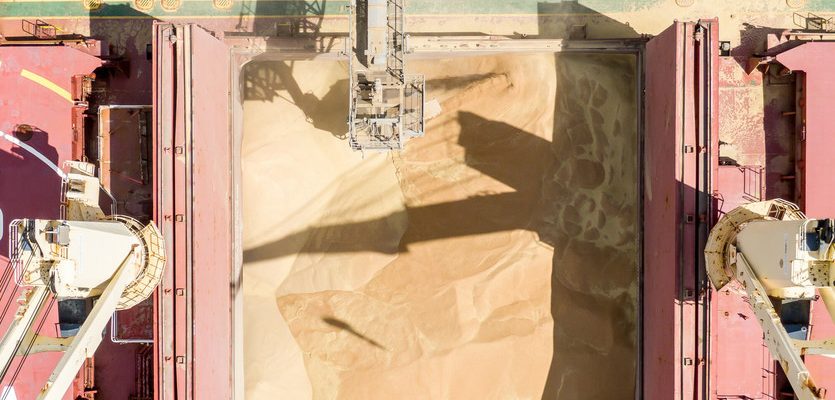At the turn of March and April, there was a serious crisis related to the uncontrolled influx Ukrainian grain to Poland. As a result, Polish farmers had trouble selling their native grain. Minister of Agriculture Henryk Kowalczyk assured at the end of the year that grain prices would increase. However, this did not happen and the farmers were enraged. In several places in Poland protests took placeof which it was a consequence resignation of Kowalczyk and appointment of a new minister – Robert Telus.
On April 15, at a special agricultural convention, PiS announced that imports of Ukrainian grain will be suspended. Moreover, the government is to compensate farmers for differences in grain prices, and to maintain subsidies for fertilizers and fuel. The task was clear – until the next harvest, warehouses filled with Ukrainian grain must be emptiedso that there is room for the native seed.
The problem is that farmers are not in a hurry to sell grain, because the price is not satisfactory. One of them sent us a photo from a local purchase, where we can see that the price of wheat is PLN 600, barley PLN 500, triticale PLN 400 and rye PLN 300.
– For this money, it is not a sale, but a donation of grain. They buy wheat from us for PLN 600, rye for PLN 300. This is drama. Everything is covered up to the cork, he argues farmer Bartholomew Szajner.
– The real drama awaits us all after the harvest. Everyone’s talking about saving this season, clearing out the warehouses. The disaster will come after the harvest, because the production of new grain is the most expensive in history. Fertilizers were expensive, all means are more expensive. The people after the harvest will have to pay it all back. How will they pay for it, since they will have to pay for each hectare? There will be no profit here, it will not even come to zero – Szajner spreads his hands.
The subsidies announced by the ruling party are to be a rescue. However, the current rates have not encouraged farmers to sell grain and empty their warehouses at the same time.
– The priority of the entire ministry is to encourage farmers to transport grain from silos and warehouses to grain purchases, and then from these purchases further. We cleared the whole process, increased the capacity of the ports, recently I was in Gdynia. The bottlenecks have been eliminated and exports are proceeding smoothly, he said at the end of the week Prime Minister Mateusz Morawiecki.
Government in the second half of May increased wheat subsidies to over 3,000 PLN per hectare. Support for sold cereals in all forms is to be granted to all farmers up to the first 300 hectares of crops. It concerns the sale of grain until June 30.
– We made such an incentive to reflect the commitment of President Jarosław Kaczyński expressed at the convention in mid-April. Due to the drop in prices on world markets, we have increased the payment per hectare, which can be converted into a payment per tonne of specific cereals. We have fulfilled our obligations. We encourage farmers to sell grainso that there is no problem of overcrowded warehouses at the time of harvest – emphasizes Morawiecki, which at the same time once again expressed that the problem exists.
How is it in practice? Szajner: – If someone has little grain, eg several tons, they will sell it. If someone has, for example, 500 tons, no one will undertake to collect it. There is no space. Everything is filled to the brim. A friend who has a purchase buys only as much as he can take away. Something started after the minister was replaced, but the bomb is ahead of us. We are waiting for the harvest and it will be a drama. People will want to run away with the goods because they will have to pay their debts.
Our interlocutor admits that many of his colleagues are still waiting to sell grain. – Subsidies are for the goods from last year, and after the harvest there will be a new one. You would have to pay 6,000 per hectare. for it to be done well. At today’s price of wheat, the yield would have to be 10 tons per hectare, which is impossible, he adds.
Meanwhile, the government comes up with another ad hoc aid instrument. It offers the so-called low-interest liquidity loans. In short: a farmer who currently has problems with financial liquidity can take advantage of a loan. – Most likely, people will grab these loans, but is this the solution? Hurry credit with credit? It is a loop and at some point it will break, Szajner believes.
A farmer from the Lublin region draws our attention to one more extremely important problem that concerns Ukrainian grain entering Poland. In his opinion, grain still goes to Poland and is reloaded on trucks at the border. As proof, he shows short videos.
– I saw how the goods are reloaded from wagons to trucks. There are no seals, no supervision. The trains have probably been standing there for several weeks. That’s what people say. There are 400 wagons and no owner. Even if such wagons are parked on the siding, the so-called axial. You have to pay for each day. In a few days, these are huge sums, so who pays for a few weeks of parking? – wonders.
Meanwhile, Minister Telus admitted on Polish Radio that grain from Ukraine still enters Poland, but on the basis of contracts signed before April 15, 2023before the regulation suspending the import of grain from Ukraine came into force.
16,000 have arrived so far. tons, it’s really very little, argued Telus. – This grain must be unloaded, (…) but these are really small amounts – mainly corn, some wheat, 1 thousand. tons at the moment. (…) It is under full control, he assured Minister of Agriculture.
Szajner, who was involved in the protests in Okopy at the beginning of February this year, believes that the change of the minister did not bring much. Nevertheless, the latest PiS proposals calmed down the mood among farmers. They’re just dreams, stories. They stop people a little before the protests with these subsidies. But who will pay for all this? This money doesn’t come from nothing. We will all pay for it – Szajner shrugs his shoulders.
Want to talk to the author? Write to lukasz.szpyrka@firma.interia.pl







